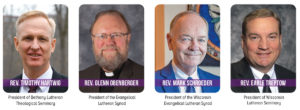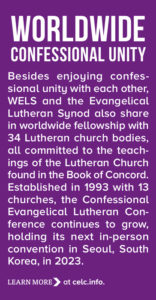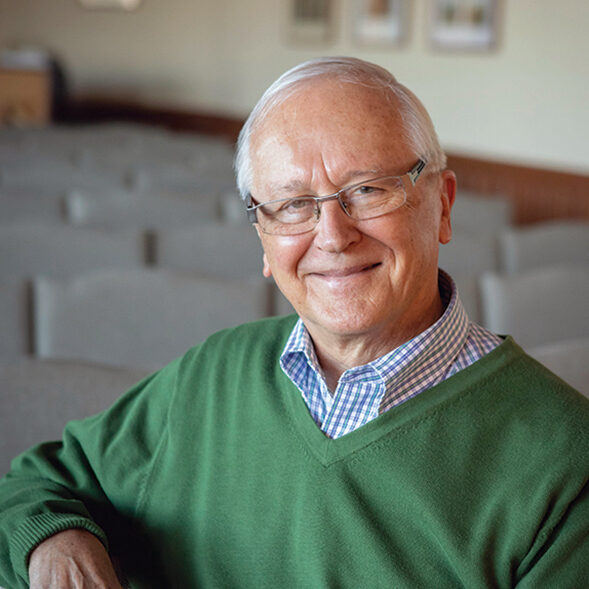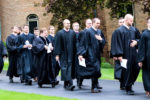 |
Four leaders comment on faith and fellowship as we celebrate the unity that has endured for 150 years between the Evangelical Lutheran Synod and the Wisconsin Evangelical Lutheran Synod.
“You believe what?!” When we confess our faith in Jesus and what the Bible teaches, sometimes we hear such a response. At other times, it might seem that we are all alone in what we believe and teach.
“Our postmodern culture has declared the individual free to form whatever religious opinion he or she wants. Effectively, it has made the individual a ‘god,’ ” says Timothy Hartwig. “We are different from society because we believe there is a God who has revealed himself to us in the Bible.”
Mark Schroeder agrees. “What makes us so different in society and what makes us so different in comparison with other churches and other popular religious thought? Our commitment to holding on to absolute truth and not changing our doctrine to suit the whims of culture, society, or ‘science.’ Itching ears want to hear all kinds of things; we have been blessed to avoid accommodating them.”
Glenn Obenberger reminds us of the basis of our faith and unity: “The authority in our synods is the Word of God guiding us in all that we speak and do. We do not find an authority in any other source, not pope, not councils, not tradition, not what I feel in my heart, not popular opinions.”

Appearances
That means that some will think we are arrogant and stubborn. “No doubt everyone who confesses that they have the truth will be considered arrogant and closed-minded,” says Schroeder.
“Our confession is based on the Word of God as the authority for all we teach and practice, and we recognize that this will always appear as foolishness to our sinful natures. . . . We should always attempt to avoid being obnoxious in bearing witness to the truth, while realizing that the gospel is an offense or stumbling block to many,” remarks Obenberger.
Earle Treptow says, “There’s no question that some consider us arrogant and accuse us of thinking that we’re better than others. . . .We in WELS and the ELS aren’t smarter than anyone else or better than anyone else; we’re simply recipients of God’s grace.”
“Our confessional unity can be considered arrogant by others and it can certainly be presented in an arrogant manner,” comments Hartwig, “however, our confessions are one of the ways that we are transparent. We don’t hide what we think and believe.”
Our commitment
Our commitment to God’s truth makes us different. “Church bodies that no longer stand on the Scriptures and the confessions have introduced teachings and practices that represent a clear departure from God’s truth,” says Schroeder.
“Some church bodies have changed their understanding of God’s Word over time, and that has led to a gradual decline in their doctrine and practice,” notes Hartwig. “God’s Word has not changed. Therefore, our confession should not change.”
Treptow identifies the reason we are committed to the Scriptures: “Why do we cling so stubbornly to our teachings? I would simply say that we love God’s Word, which points us to our Savior, and we cannot compromise God’s teachings. They’re our Savior’s teachings, not ours.”
Treptow then focuses on the essential message we treasure: “The Lord has graciously led us to confess and teach that God has declared the world righteous in Christ. There is no fine print, and there are no strings attached. There is nothing that people must do to live with God now and forever. We have what everyone needs most of all: the forgiveness of sins full and free in Christ. This is the special gift given to us that we have to give others. The Lord has placed that message in our hearts and our mouths that we might be a blessing to others, to be the Lord’s instruments to give them peace that can be found only in Christ.”
Our witness
That witness is for the world around us and the members of our churches.
“Confessional unity is a witness because it is a witness to the truth—God’s truth,” says Schroeder. “In a world where absolute truth is ridiculed and discarded, a church that confesses unchanging and absolute truths sends a clear message. Here we stand, and nothing will change that. The same witness—even externally—is also a reassurance to our own members since their beliefs and values will be constantly challenged by the world and the culture.”
“As God gives us strength, we are not going to compromise on God’s teachings. . . . We love God’s Word too much,” says Treptow.
He continues, “Members of the ELS and WELS find encouragement from one another. . . . By our fellowship, each synod is asking the other, ‘Please hold us accountable to our confession. Help us to stand firm in temptation. Enable us to confess God’s Word with joy even if it may mean persecution.’ We need that encouragement desperately. And God has graciously provided it to us as a gift.”

Obenberger agrees, “We are among Christian brothers, loving one another as Jesus loves us and recognizing that we are partners in the gospel seeking to obey all that Christ has commanded us to do in the locations and cultures in which he has placed us.”
God’s gracious gift
The confessional unity between the ELS and WELS is a gift of God’s grace. Treptow reminds us of that blessing: “There is no unity or peace unless the Lord graciously grants it. . . . By declaring fellowship with those who believe, teach, and confess what we do, we are making this statement to any who will listen, ‘Doctrine is important.’ God has graciously given us sisters and brothers who stand alongside us and confess what we do. . . . We enjoy confessional fellowship with another church body in the United States and others around the world (see sidebar). We are not alone, and we need not feel we are the only ones left.”
Obenberger strikes a common note for us all: “By the grace of God, may we continue to engage each other in our united lives as confessional Lutheran Christians. We trust that as we show love in our open and free discussions we will seek to support each other in all that we do and say based on the Word of our Lord. May we give our Lord continual thanks for this cherished fellowship among us and ask for continued blessings which we have come to expect these past 150 years.”
Author: John Braun
Volume 109, Number 10
Issue: October 2022







